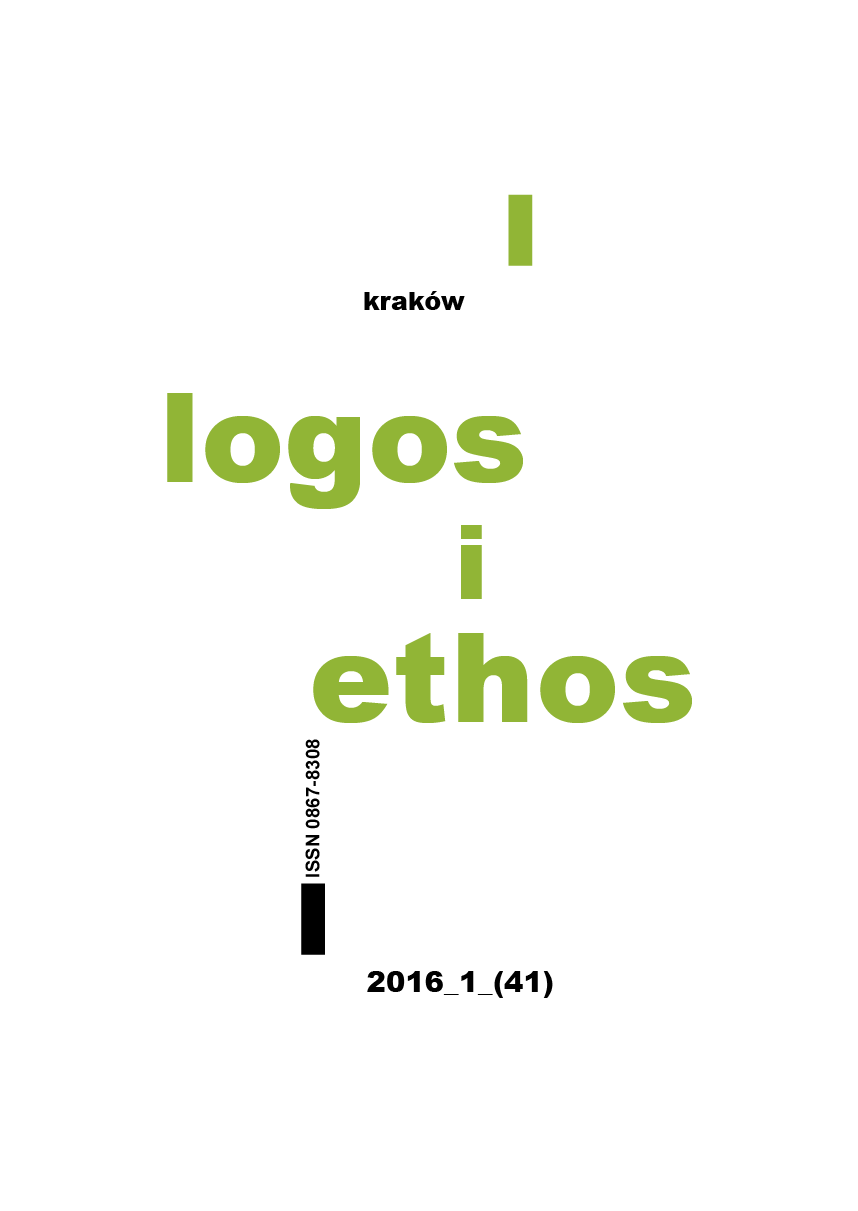Metafizyka praktycznego rozumu. Autonomia i heteronomia wedle Kanta i Lévinasa
DOI:
https://doi.org/10.15633/lie.1792Słowa kluczowe:
autonomia, heteronomia, etyka, podmiotowość, metafizyka, całość, nieskończoność, imperatyw, powszechność, Kant, LévinasAbstrakt
Relacje, które określają dwa odmienne projekty etyki – etykę autonomiczną Kanta i etykę heteronomiczną Lévinasa – są skomplikowane i niejednoznaczne. Z jednej strony Lévinas zalicza Kanta w poczet myślicieli transcendentalnych, którzy bronią silnego podmiotu poznawczego wraz z właściwą mu władzą tworzenia przedstawień. Z drugiej jednak strony Lévinas odnajduje w Krytyce praktycznego rozumu ważny ślad transcendencji, a mianowicie: możliwość przekroczenia skończoności ludzkiego bytu w przestrzeni refleksji moralnej. Wskazanie na sens niezależny od bytu, a więc myślenie wykraczające poza granice zakreślone przez zmysły, to w przekonaniu Lévinasa właściwa zasada Kantowskiej „rewolucji kopernikańskiej”. Największa zasługa Kanta nie polega więc ani na tym, że uznał podmiot za aktywny element poznania, ani na tym, że zażegnał spór między empiryzmem i racjonalizmem. Wielkość Kanta, którego interpretuje Lévinas, polega na odkryciu drogi wiodącej od skończoności wiedzy naukowej do nieskończoności poznania moralnego. Choć mogłoby się wydawać, że w ograniczonym kręgu rozumu teoretycznego jesteśmy zamknięci w sposób nieodwołalny, to jednak szansa przełamania granic wyznaczonych przez zmysłowość pojawia się w polu rozumu praktycznego. Dobitny wykład prawdy o skończoności ludzkiego poznania nie jest ostatnim słowem Kanta. Właściwe przesłanie jego filozofii – zarówno części krytycznej, jak i pozytywnej – można by sformułować w taki oto sposób: tam, gdzie kończy się wiedza ściśle naukowa, rozpoczyna się poznanie o charakterze moralnym. Poza horyzontem świata, który znamy dzięki widzeniu, patrzeniu i dotykaniu, otwiera się pole metafizycznej spekulacji.
Te właśnie wątki, a więc zarówno podobieństwa, jak i różnice, które dzielą etykę Kanta i Lévinasa, podejmuje niniejszy artykuł. Kant zastrzega, że wyłącznie „czysty rozum praktyczny”, wolny od wszelkich zmysłowych wrażeń, gwarantuje powszechność prawa moralnego. Lévinas natomiast przekonuje, że to właśnie unikatowe wydarzenie, a więc „twarzą w twarz” z drugim człowiekiem, jest pierwszym impulsem moralności. Zgodnie z wykładem Kanta relacja z drugim człowiekiem jest z góry zapośredniczona przez siłę imperatywu, który nakazuje traktować go zawsze jako cel sam w sobie, nigdy zaś jako środek. To samo zagadnienie inaczej przedstawia Lévinas, który twierdzi, że warunkiem etycznej relacji z drugim człowiekiem jest bezpośrednie doświadczenie jego odmienności. W tak określonej przestrzeni sporu rodzą się dwie konkurencyjne koncepcje etyki.
Bibliografia
Basterra G., The subject of freedom: Kant, Lévinas, New York 2015.
Davies P., Sincerity and the end of theodicy: three remarks on Lévinas and Kant, [w:] Cambridge companion to Lévinas, eds. S. Critchley, R. Bernasconi, Cambridge 2004, s. 161–187.
Dietzsch S., Immanuel Kant. Biografia, przeł. K. Krzemieniowa, Warszawa 2005.
Lévinas E., Całość i nieskończoność. Esej o zewnętrzności, przeł. M. Kowalska, Warszawa 2002.
Lévinas E., Inaczej niż być lub ponad istotą, przeł. P. Mrówczyński, Warszawa 2000.
Lévinas E., O Bogu, który nawiedza myśl, przeł. M. Kowalska, Kraków 1994.
Lévinas E., Trudna wolność. Eseje o judaizmie, przeł. A. Kuryś, Gdańsk 1991.
Kant I., Uzasadnienie metafizyki moralności, przeł. M. Wartenberg, Kęty 2001.
Kant I., Krytyka czystego rozumu, przeł. i oprac. R. Ingarden, Kęty 2001.
Kant I., Prolegomena do wszelkiej przyszłej metafizyki, która będzie mogła wystąpić jako nauka, przeł. B. Bornstein, Warszawa 2010.
Kant I., Krytyka praktycznego rozumu, przeł. i oprac. B. Bornstein, Kęty 2002.
Kant I., Uzasadnienie metafizyki moralności, przeł. M. Wartenberg, Kęty 2001.
Kant I., Religia w obrębie samego rozumu, przeł. i oprac. A. Bobko, Kraków 2007.
Kant I., Metafizyka moralności, przeł. E. Nowak, Warszawa 2005.
MacIntyre A., Krótka historia etyki. Filozofia moralności od czasów Homera do XX wieku, przeł. A. Chmielewski, Warszawa 2002.
Malka S., Emmanuel Lévinas. His life and legacy, transl. M. Kigel, S. M. Embree, Pittsburgh 2006.
Migasiński J., Transcendentalizm Lévinasa, „Filo‑Sofija” 2006 nr 1 (6), s. 21–41.
Ricoeur P., O sobie samym jako innym, przeł. B. Chełstowski, oprac. M. Kowalska, Warszawa 2005.
Rogóż D., Anty‑Odyseja. Antropologia Emmanuela Lévinasa, Kraków 2012.
Staehler T., Plato and Lévinas: the ambiguous out‑side of ethics, New York–Abingdon 2010.
Wierzbicka A., Semantyka. Jednostki elementarne i uniwersalne, przeł. A. Głaz, K. Korży, R. Tokarski, Lublin 2010.
Wyschogrod E., Emmanuel Lévinas: the problem of ethical metaphysics, New York 2000.
Pobrania
Opublikowane
Numer
Dział
Licencja
Autorzy publikujący w czasopiśmie udzielają jego wydawcy zgody o następującej treści:
- Autor zachowuje autorskie prawa majątkowe do utworu, a jednocześnie udziela wydawcy czasopisma zgody na jego pierwszą publikację w wersji drukowanej i wersji online na licencji Creative Commons Uznanie autorstwa 4.0 Międzynarodowe oraz zgody na wykonywanie opracowań, w tym przekładów.
- Autor ma możliwość udzielania zgody niewyłącznej na opublikowanie utworu w wersji, która ukazała się w czasopiśmie (np. zamieszczenia go w repozytorium instytucjonalnym lub opublikowania w książce), wraz z informacją o jego pierwszej publikacji w czasopiśmie.
- Autor może umieścić swój utwór online (np. w repozytorium instytucjonalnym lub na swojej stronie internetowej) jeszcze przed zgłoszeniem utworu do czasopisma.

